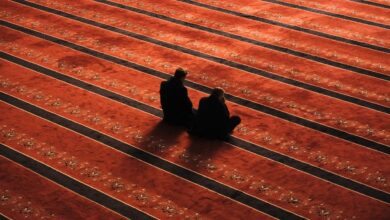10 Rules of Islam : Guiding Principles


Introduction of 10 Rules of Islam
Islam, the world’s second-largest religion, follows a set of guiding principles that form the foundation of its beliefs and practices. These principles, known as the Ten Rules of Islam, provide a comprehensive framework for Muslims to lead a righteous life filled with compassion, piety, and respect for others. Emphasizing the unity of God and the importance of moral conduct, these rules are essential to the spiritual growth and well-being of every Muslim. In this article, we will explore these ten fundamental rules and their significance in shaping the lives of millions around the globe.
Shahada – The Declaration of Faith:
The first and most fundamental rule of Islam is Shahada, the Declaration of Faith. Muslims proclaim, “There is no god but Allah, and Muhammad is His messenger.” This declaration underscores the core belief in the oneness of God and the prophethood of Muhammad (peace be upon him). It serves as the entry point to Islam and symbolizes the commitment to submit to Allah’s will.
Salah – The Ritual Prayer:
Salah, or the five daily prayers, serves as a constant reminder of a Muslim’s devotion to Allah. These prayers, performed at specific times throughout the day, encourage mindfulness and spiritual reflection, fostering a deeper connection with the Creator. The discipline of regular prayers helps Muslims maintain a sense of purpose, humility, and gratitude.
Zakat – The Act of Charity:
Zakat, the obligatory act of giving alms to those in need, exemplifies the Islamic principle of compassion and social responsibility. By sharing wealth with the less fortunate, Muslims promote societal harmony and alleviate poverty. Zakat ensures that wealth circulation remains fair and balanced, promoting a sense of community and empathy among Muslims.
Sawm – Fasting during Ramadan:
Sawm, or fasting during the holy month of Ramadan, allows Muslims to develop self-discipline, empathy, and spiritual purification. Abstaining from food and drink from sunrise to sunset, Muslims engage in increased prayer, recitation of the Quran, and charitable acts during this period. Fasting fosters a heightened awareness of one’s actions, thoughts, and deeds, promoting self-improvement and closeness to Allah.
Hajj – The Pilgrimage to Mecca:
Hajj, the pilgrimage to the holy city of Mecca, is an obligation for Muslims who are physically and financially able. It represents the unity of the Muslim community and serves as a symbol of equality and humility before Allah. Performing the rituals of Hajj reinforces the importance of seeking forgiveness, cleansing one’s soul, and seeking spiritual renewal.
Respect for Parents and Family:
Islam places great emphasis on honoring parents and maintaining strong family ties. Treating parents with love, respect, and kindness is considered a virtuous act and a means to gain Allah’s pleasure. Maintaining close-knit family bonds promotes harmony within society and fosters emotional stability and support for individuals.
Honesty and Integrity:
Integrity and honesty are crucial virtues in Islam. Muslims are encouraged to speak the truth, act ethically, and fulfill promises and obligations. Being truthful and trustworthy not only leads to personal growth but also fosters trust within communities and contributes to a just and honest society.
Modesty and Humility:
Modesty and humility are essential qualities in Islam. Muslims are encouraged to dress modestly, display humility in their actions, and avoid arrogance and pride. By embodying these qualities, Muslims strive to remain grounded and focused on spiritual growth, rather than materialistic pursuits.
Compassion and Forgiveness:
Islam advocates for compassion and forgiveness towards others, even in difficult circumstances. Responding to harm with kindness and forgiveness is highly esteemed, as it allows for healing and reconciliation. These values create a harmonious and peaceful society where conflicts can be resolved through dialogue and understanding.
Prohibition of Harmful Acts:
Islam strictly prohibits actions that cause harm to oneself or others. This includes avoiding alcohol, drugs, and other harmful substances, as well as refraining from unjust actions, backbiting, and violence. These prohibitions aim to protect individuals and communities, fostering an environment of safety and wellbeing.
Conclusion:
The Ten Rules of Islam provide Muslims with a comprehensive ethical and moral code to follow, guiding them towards spiritual growth, righteousness, and compassion. These principles promote a harmonious and just society where individuals can find inner peace and fulfillment. By adhering to these fundamental rules, Muslims strive to become better individuals, contributing positively to the world around them and seeking the pleasure of Allah. The practice of these rules forms the cornerstone of Islamic teachings, shaping the lives of millions and serving as a guiding light on their spiritual journey.x
What are the 10 Rules of Islam?
The 10 Rules of Islam, also known as the Five Pillars and the Five Pillars of Faith, are the essential principles that form the foundation of Islamic belief and practice. These rules are: Shahada (Declaration of Faith), Salah (Ritual Prayer), Zakat (Act of Charity), Sawm (Fasting during Ramadan), and Hajj (Pilgrimage to Mecca).
What is Shahada, the Declaration of Faith?
Shahada is the fundamental belief and proclamation in Islam that there is no god but Allah, and Muhammad (peace be upon him) is His messenger. It serves as the entry point to Islam and symbolizes a Muslim’s commitment to submitting to Allah’s will.
How often do Muslims perform Salah, the Ritual Prayer?
Muslims are required to perform five daily prayers, known as Salah, at specific times throughout the day: Fajr (dawn), Dhuhr (midday), Asr (afternoon), Maghrib (sunset), and Isha (night). These prayers are essential for maintaining a strong connection with Allah and promoting mindfulness throughout the day.
What is Zakat, and why is it important in Islam?
Zakat is the act of giving alms to those in need, representing an obligation for financially capable Muslims. It promotes compassion, social responsibility, and wealth redistribution within the Muslim community, fostering a sense of unity and empathy.
How does Sawm, fasting during Ramadan, benefit Muslims spiritually?
During the holy month of Ramadan, Muslims fast from sunrise to sunset, refraining from food, drink, and other physical needs. Fasting in Ramadan fosters self-discipline, empathy for the less fortunate, and spiritual purification, allowing Muslims to draw closer to Allah and enhance their spirituality.
What is the significance of Hajj, the pilgrimage to Mecca?
Hajj is an obligation for Muslims who are physically and financially able to make the journey. It represents the unity of the Muslim community and serves as a symbol of equality and humility before Allah. Hajj is a profound spiritual experience, seeking forgiveness, cleansing the soul, and renewing one’s commitment to Islam.
Why is respecting parents and family important in Islam?
Islam places great emphasis on honoring parents and maintaining strong family ties. Treating parents with love, respect, and kindness is considered virtuous and leads to personal growth and blessings from Allah. Strong family bonds promote social stability and emotional support within society.
How does Islam emphasize honesty and integrity?
Honesty and integrity are integral to Islamic teachings. Muslims are encouraged to speak the truth, act ethically, fulfill promises, and avoid deception and dishonesty. Upholding these virtues fosters trust, respect, and accountability in personal and societal interactions.
What does modesty and humility signify in Islam?
Modesty and humility are essential qualities in Islam. Muslims are encouraged to dress modestly, display humility in their actions, and avoid arrogance and pride. Embodying these values helps individuals stay grounded, prioritize spiritual growth over materialism, and cultivate a humble disposition.
How do compassion and forgiveness play a role in Islam?
Islam advocates for compassion and forgiveness towards others, even in challenging situations. Responding to harm with kindness and forgiveness promotes healing and reconciliation, fostering a harmonious and peaceful society where conflicts can be resolved through empathy and understanding.





